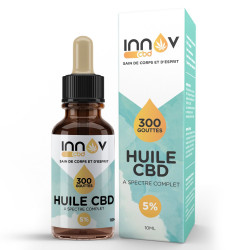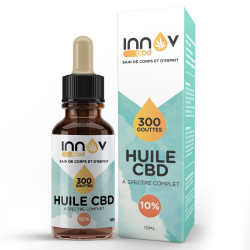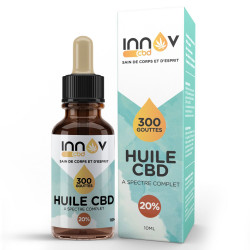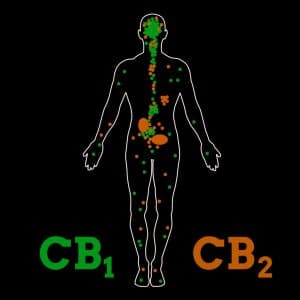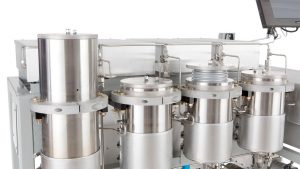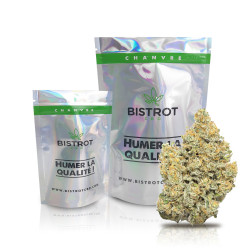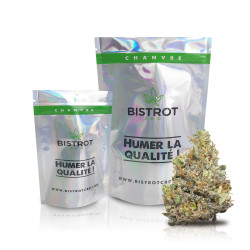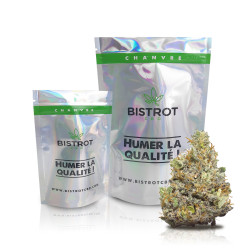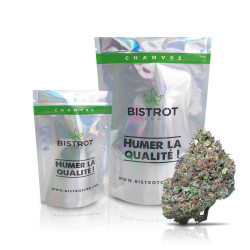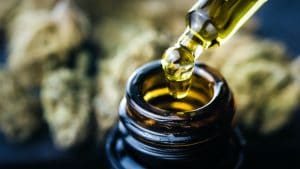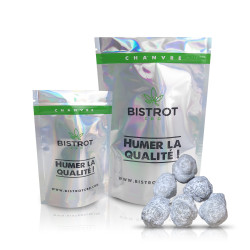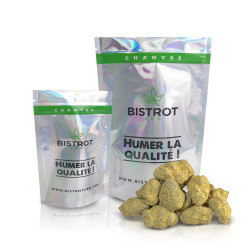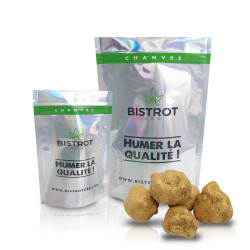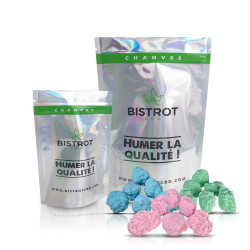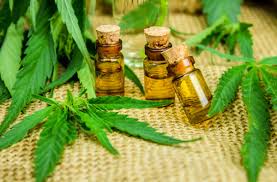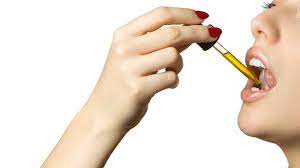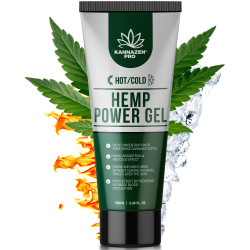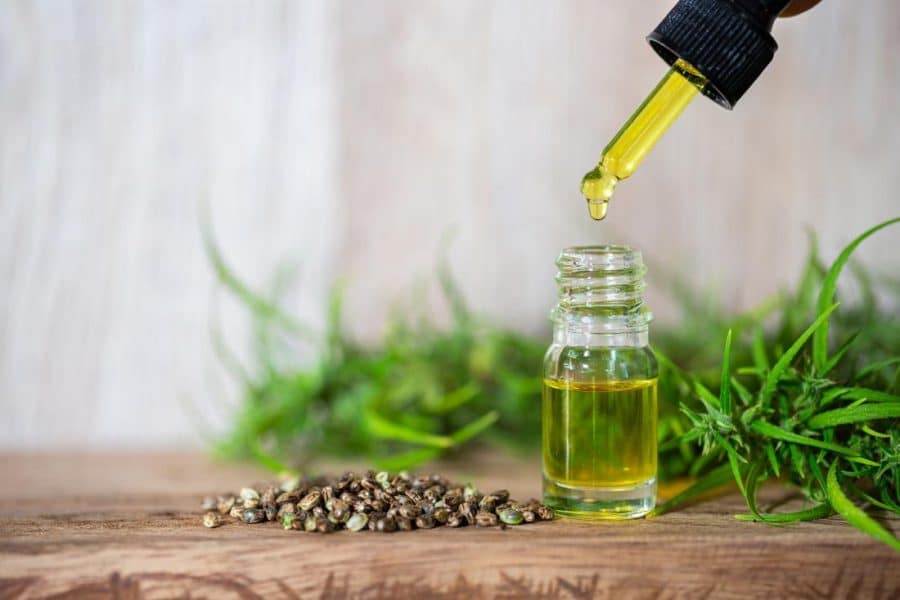
Cannabidiol (CBD) is one of the active substances (cannabinoids) found in significant amounts in cannabis. Unlike tetrahydrocannabinol (THC), the CBD molecule has no psychotropic action. Therefore, it is not included in the list of narcotics. This characteristic distinguishes it clearly from THC. For a long time, cannabis was considered a simple drug for recreational use. But in recent years, many benefits have been highlighted by CBD oil users suffering from chronic pain.
Today, a legislative and medical chill prevents CBD from being considered as truly therapeutic. However, many meticulous studies seek to confirm or not its virtues!
In any case, it is increasingly part of a growing global market. It takes advantage of a legal vagueness of the French law (cannabis vs CBD). As a result, it is found in many products in the windows of CBD shops. There are various forms of goods on sale containing CBD (flowers, balm, capsules, liquids, …). But, the oil, remains the flagship product of CBD users! Direct consequence of its effects and its simplicity of absorption. But in fact, what is this coveted CBD oil? What are its virtues, its dosage? Where can we find them? Are some absorption methods more relevant than others? Is there a quality to be favored? We tell you everything…
CBD oil in France
The French legislation around CBD
CBD or cannabidiol, like THC, is one of the many (about a hundred) cannabinoids present in hemp. Essentially found in the leaves and flowers of hemp, this molecule has become very popular in recent years. However, it is still sometimes misunderstood by those who are new to the subject. If the latter rightly associate CBD and cannabis, they unfortunately still have an unfortunate tendency to equate it with a drug.
What the French law says about hemp :
- “In application of article 5 of the 1971 law, the possession of narcotic products, and therefore of cannabis, is prohibited without authorization” (1).
In reality, it is the THC molecule that is the psychotropic substance prohibited in France. The cannabic products found on the market, such as CBD oil, are totally legal:
- Their concentration in THC is almost null (tolerance < 0,2%) even non-existent.
In 2017, a WHO (World Health Organization) report described cannabidiol as non-toxic:
- “During its November 2017 meeting, the WHO Expert Committee on Drug Dependence concluded that, in its pure state, cannabidiol (CBD) does not appear to have abuse potential, nor does it appear to be harmful to health. Thus, as cannabidiol is not currently classified as a substance in its own right, current information does not support a change in status or classification of this substance” (2).
The effects of CBD on the body
If the affinity of tetrahydrocannabinol for the CB1 and CB2 receptors of the endocannabinoid system leads to psychic modifications, it is because it binds more rapidly to the receptors than the endocannabinoids themselves (cannabinoids naturally present in the body: anandamide and 2-arachidonyl-glycerol). THC will mimic anandamide but in a roundabout and powerful way. This then leads to brain and physical problems.
Cannabidiol (CBD) has no significant affinity for endocannabinoid receptors, its action mainly inhibits the production of the FAAH enzyme (fatty acid amide hydrolase) responsible for the regulation of the anandamide molecule. The result is a hyper-production of this endocannabinoid which will then promote positive protective and innate responses of the body (relaxation, relaxation, anti-pain,..). At high levels, CBD can also inhibit the actions of THC bound to CB1 receptors which will cancel the psychotropic action of the molecule.
For its many properties such as muscle and brain relaxation, CBD can not yet claim to be a therapeutic treatment in the same way as a drug but a large number of scientific studies and many testimonials from its users highlight its benefits that help some of the ailments of everyday life: insomnia, chronic headache, some minor pain, anxiety, stress …
To date, the product containing CBD 100% legal, the easiest to use and the most effective is by far :
CBD oil.
What is CBD oil?
Simply put, CBD oil is a hemp concentrate. Depending on the method of extraction, it differs in its composition. There are mainly 3 methods to extract CBD from the plant:
CBD oil extraction by liquid chemical solvents
Here, we use the whole cannabis plant. Once decarboxylated (freed from its acid carboxyls by being heated), the hemp plant is soaked in liquid solvents (ethanol or butane or isopropyl alcohol). The latter will separate the cannabinoids, terpenes (mainly responsible for the organoleptic properties of marijuana) and flavonoids (phyto-nutrients responsible for the color of the pistils of cannabis flowers) from the rest of the plant material. The resulting liquid is then heated. The resulting evaporation facilitates the recovery of the finished product:
- cannabis oil
This method is by far the simplest and least expensive. On the other hand, the use of solvents is not harmless because they indirectly affect the quality of oils obtained. For example:
- Ethanol also tends to extract chlorophyll from the plant. The result is a bitter, long-lasting and unpleasant taste in the mouth.
- Butane leaves toxic residues in the oil. So it’s not the best for your health. Because of its price and because the active substances of cannabis are fully extracted, this type of extraction is mainly used in the manufacture of electronic cigarette liquids. The latter are often cut with synthetic terpenes to compensate for the poor taste. A specialty store that is vigilant about the quality of its merchandise should not sell solvent extracted CBD oils.
The extraction of CBD oil by vegetable oil
With this practice, the plant is directly heated in vegetable oil (sesame or olive type). The separation of the available active substances is done naturally thanks to their lipophilic properties. This extraction technique is inexpensive, simple, the most natural and by far the healthiest for the body. However, it is very difficult with this technique to know the dosage of available CBD molecules in the finished product. It is perfect for homemade extraction of cannabis oil or for cannabidiol balms and ointments. But, the oils on the market CBD cannot be derived from it.
CBD oil extraction with supercritical Co2
It consists in putting the whole cannabis plant, previously decarboxed, in a press system. Different successive chambers, with varying temperatures, circulate the CO2 in the hemp and select thus the desired substances. It results in an isolation of certain cannabinoids (very concentrated oil).
This method is much more complex to develop and more expensive. It requires advanced laboratory equipment. On the other hand, it is of much better gustatory quality. As for its CBD dosage, it can be easily controlled.
Opinion on the best method of extraction of CBD oil
Each of these methods has its qualities and disadvantages. However, a CBD shop that respects itself, must offer only one for sale: CBD oil extraction with supercritical CO2. And that is if:
- it wants to respond seriously to the French legislation
- customer satisfaction is a priority
Whatever the technique, it is important to take into account the varieties of cannabis in order to remain within the law. Indeed, only hemp with a THC concentration lower than 0.2% is legal.
The different types of CBD oils
In a CBD store that is attentive and respectful of consumer expectations and that works with a serious laboratory and cannabidiol farm, CBD oil can be found essentially in 2 forms:
- Full spectrum oilThis full spectrum oil is derived from a CO2 extraction of legal cannabis varieties. Unlike broad spectrum oils, raw oil retains all the original concentrations of most of its available molecules (terpenes, CBD, THC, CBG…) naturally in a cannabis plant. In France, the THC content of the hemp used to make this oil must never be higher than 0.2% for it to be legal. This oil is slightly more expensive than other CBD oils. But, it is important to understand that quality has a price. Here, everything is controlled, analyzed and elaborated! And this, from the hemp seeds to the finished CBD product!
- The broad spectrum oilThis broad spectrum CBD oil is, except for one detail, similar to the full spectrum one. It undergoes an additional step to remove the THC naturally available in the plant. This step is crucial and this extraction is often done with ethanol. This results in the breakdown of other cannabinoids, terpenes and flavonoids. This will have an impact on the flavors and action of the oils. On the other hand, they have the excellent quality of being 100% legal since they do not contain the slightest trace of psychotropic substances. There, we don’t talk about thresholds anymore, they are clean!
If we only take into account these 2 types of oils, it is difficult to give an opinion on the best of the 2. If one (full spectrum) keeps all its available molecules allowing a relevant surrounding action, the other (broad spectrum) is free of narcotic substances. This detail gives it a certain notoriety and ensures its legality! As a reminder, THC is a psychotropic molecule. If in the full spectrum oil its content is almost zero, it is still present!
Choosing the best CBD oil
To choose your CBD oil, it seems logical to go towards products :
- organic guaranteed without pesticides
- meets the legislative standards of the country relating to its consumption
But, these selection criteria aside, there is no better oil. This notion is too subjective and specific to each individual.
The effects of CBD oil
CBD oils can be found in different rates:
- Cannabidiol concentration starting from 5% and generally going up to 30%.
These levels meet very particular and specific needs for an individual. On the other hand, they will not necessarily be the ideal of another.
Represented by 2 types of spectra (full spectrum or broad spectrum) and from different varieties of cannabis plants, CBD oils will obviously not have the same effects and the same gustatory qualities from one oil to another. But, also from one individual to another!
- Each organism responds differently physiologically and physically to identical stimuli
The best CBD oil for its benefits
If we isolate personal tastes and focus on the benefits of CBD oil, then yes! There is indeed a better oil than the others:
The effect of each active substance in this oil interacts with the potential of the other molecules. This molecular collaboration then increases the plurality of reactions and their efficiencies. We speak of the “entourage effect” described by an Israeli researcher, Raphaël Méchoulam, in 1998 (3). This effect is still widely studied.
However, some people prefer to keep the unique effect of CBD alone (CBD isolate) when others want a more powerful effect. It’s all a matter of taste!
The benefits of CBD oil
As a reminder, CBD oil is legal in France.
A good number of testimonies give it many virtues still under study (neurogenesis, anti-angiogenesis, anxiolytic…). However, some of its benefits are no longer in question:
- calms pain (anti-inflammatory)
- relaxing effect.
The virtues of CBD would come from its inhibiting action on the production of an enzyme belonging to our endocannabinoid system. This enzyme is naturally responsible for the regulation of anandamide (commonly called “happiness hormone”).
CBD as an anti chronic pain
Chronic pain, by its nature and persistence, often requires a multi-drug approach to pain management. However, if a treatment relieves and/or treats a patient, taking medication at the same time can cause side effects. These can sometimes be as disabling as the reason for taking them. In January 2017, the U.S. National Academy of Sciences, Engineering and Medicine released a report on the therapeutic applications of cannabis. Significant evidence is reported on the efficacy of medical hemp in the treatment of chronic pain in adults (4). In 2006, a scientific study was published in the journal Annals of Pharmacotherapy. It focuses on the use of cannabinoids (CBD, THC, CBN, CBG …) as analgesics and concludes that :
- “Chronic pain often requires a polypharmaceutical approach to management, and cannabinoids are a potential addition to the arsenal of treatment options” (5).
Indeed, this natural alternative is particularly interesting since CBD has no psychotropic side effects. However, it is preferable to consult a physician before taking any self-medication in order to avoid unwanted molecular interactions.
CBD as a painkiller and anti-inflammatory
Scientific studies and research on the alleged beneficial properties of CBD revealed by its consumers are multiplying. However, there are still doubts about the therapeutic effectiveness of CBD. This is mainly because its mode of operation on the SEC is not yet fully understood. On the other hand, most studies testing the efficacy of the cannabidiol molecule in relieving pain and inflammation almost all tend towards the same conclusion:
- CBD is soothing!
This was found in particular in a 2016 study in theEuropean Journal of Pain (6). This study uses rats suffering from arthritis following an injection of adjuvants and on which scientists apply for 4 days, a topical gel (to optimize the bioavailability of CBD by the body) containing CBD. Following these tests, a significant decrease in inflammation and pain symptoms was observed. Moreover, no side effects are noticeable.
Opinions on CBD to relieve osteoarthritis
The CBD appears therefore as an interesting ally to relieve the evils caused by arthritis. However, further studies, including human studies, are needed to confirm these results.
To optimize the action (faster and more powerful) of CBD, a mode of absorption is to be preferred:
- CBD oil by sublingual application
Multiple Sclerosis and CBD oil
Users of cannabis as a chronic painkiller or for acute arthritis pain testify to the therapeutic benefits. In 2016, a Canadian study reveals these qualities in patients with multiple sclerosis (7). Indeed, of the 225 patients in the behavioral study with regard to hemp as a drug treatment:
- 50.2% would be willing to try again if medical cannabis became legal (which is the case today in Canada).
The study only looks at patients’ attitudes toward accepting a cannabis-based medication. It does not take into account the clinically proven effectiveness of relief from the effects of cannabinoids. However, it can be deduced from the findings that they benefited from this consumption:
- “Cannabis is widely accepted within the MS patient community. One in 5 people currently use the drug for reasons that differ between neuropsychiatry and neurology clinics. Use could potentially more than double if the drug were legalized.”
Buy the best CBD pain relief product
With the popularization of CBD in recent years, the range of legal cannabis products has become very diverse:
- cannabidiol balm,
- vegetable oils of hemp,
- dried flowers and leaves,
- light cannabis resin,
- capsules and seed oil capsules,
- liquids for electronic cigarette..
Each product meets the needs of a specific type of absorption and, therefore, the expectations of heterogeneous consumers. Even so, quality CBD oil is still the most powerful pain reliever. Indeed, its nature allows a mode of absorption which optimizes the bioavailability (power, quality and speed of the effects) of the molecule. As a reminder, the type of consumption of a few drops of oil in sublingual does not make the molecule undergo digestion. Therefore, it does not suffer from degradation. The time frame for action is therefore reduced!
Like any consumable (food, beverages, …), before buying a CBD product as an anti-pain, it is important to choose the products well:
- impeccable quality (organic or sustainable agriculture)
- traceability
Thus, the consumer gets the best benefits of CBD without the deleterious effects of a questionable composition. Also, before any purchase of CBD anti-pain oils, we recommend consulting a doctor. In particular, if you are already undergoing treatment, in order to avoid any interference of molecules.
The dosage of CBD oil
If the beneficial effects of CBD are real, this molecule is not authorized as a medicine. Therefore, no daily dose is officially recommended.
The effects of cannabidiol depend directly on :
- its concentration in the oil
- the physiology of the individual
- its weight
- its “therapeutic” needs
Therefore, it is impossible to recommend a precise daily amount. It is then advised, for a novice user, to start with low dosages. This is true both in terms of the concentration of the product and the number of drops swallowed. Depending on the expected effects and after a few days of use, it is then possible to increase the dose of CBD by evaluating the responses of this “treatment” on his body.
How to consume CBD oil?
The different modes of absorption of cannabidiol (CBD) oil will impact the effects of this cannabis molecule on the body.
To obtain a fast and optimal effect, it is necessary to deposit a relative quantity of oil (often estimated according to the weight of the individual) under the tongue (sublingual) using a pipette.
It is recommended:
- not to drink, eat or smoke at least 5 minutes before taking CBD
- once the oil under the tongue, wait 1 minute before swallowing to improve the assimilation by the endocannabinoid system.
Under these conditions (sublingual), the effects of CBD oil are felt after fifteen minutes. They last from 2 to 5 hours depending on the dose ingested, the weight and the physiology of the person.
It is quite possible to put the same number of drops of oil on a sugar, a cookie, in an
infusion
or in the
kitchen
. It is just necessary to be a little less demanding on the product because the effects are longer to come and lessened by the passage of CBD in the stomach.
Regardless of how you take your CBD hemp oil, it is worth repeating its use about every 6 hours. Thus, we keep all its benefits (especially regarding its role of painkiller). In most cases the benefits of CBD for the body are felt from the first intake. However, it may take a few days of “treatment” with the same dosage for the effects to be effective. It is therefore prudent to wait 1 week before gradually increasing the doses.
Do not forget to shake the bottle of oil well to homogenize the compounds and to keep it in a cool and dark place after opening.
Side effects of CBD oil
In November 2017, following a meeting of experts on drug addiction a report from the WHO comes to clarify the health situation of CBD :
- If this molecule can in no way be considered at the moment as a drug (studies in progress), it would not lead to any addiction and would not be harmful to health (8).
Based on this report and on the numerous testimonies of CBD consumers, this substance extracted from hemp would not present any danger.
CBD oil and its dangers
As the saying goes, “the exception proves the rule”. In fact, some scientific studies and rare testimonies reveal more or less important side effects of CBD:
- If the benefits of CBD are very diverse according to the opinions (anti pain, relaxation of the body and mind, …), the decrease of anxiety and insomnia are the main virtues that come back unceasingly in the testimonies of consumers. This muscular relaxation which gets CBD can sometimes involve for the sensitive people, a light drowsiness to see, a muddy state making unfit for the concentration. While this effect may not seem to exist for CBD users, it is not recommended to consume it just before undertaking an activity requiring attention, such as driving, to avoid any risk of accidents.
- The National Agency for Medicines and Health Products (ANSM) publishes in January 2019, an information point regarding the use of CBD in the treatment of epilepsy: ” Although it may be of interest in the treatment of certain severe forms of epilepsy, CBD has psychoactive effects, may be potentially toxic to the liver and is likely to increase the concentrations in the body of certain drugs, particularly anti-epileptics, with the risk of increasing their toxicity. ” (9) Scientific research published in April 2019 in the journal “Molecule” supports this point of information by administering large doses of CBD to mice to test its potential toxicity. The overdose of CBD undergone by the animals reveals important hepatic disorders (10) being able to lead to the death in certain subjects. CBD is not addictive, so there is no need to increase the recommended optimal dose. Nothing more will happen! The overdose of CBD that could lead to a real intoxication of the liver in humans seems unlikely.
- The CBD would have properties of hypotensor, of this fact, its consumption is thus to avoid for the individuals having a low tension.
- Some side effects such as nausea, temporary numbness, diarrhea, irritability and change in appetite are sometimes present among the testimonies of the users. If these remarks are not harmless, it is important to remember that CBD is often used to fight against these inconveniences. Once again, there are exceptions to the rule.
- While CBD does not show toxicity as a pure molecule, it can interact with pre-existing drugs. Beware of self-medication, which can be harmful to your health. Before taking a CBD product as a therapeutic treatment, we advise you to talk to your doctor beforehand.
- Due to a lack of hindsight and extensive studies on the development of the fetus in the presence of cannabidiol in the body, it is not recommended that pregnant women take CBD products. And this, whatever their form (balm, hemp seeds, cannabis oil, …).
- For obvious reasons, the sale of CBD products from specialized shops is prohibited to minors. Only doctors can decide to give a treatment such as Epidyolex and this has been the case since early December 2018. Indeed, the use of CBD-based drugs such as Epidyolex, is authorized temporarily and by name by the ANSM (ATU: Temporary Use Authorizations) in certain severe forms of epilepsy in children.
The quality and dosage of CBD oil, determining factors for health
If this list of potential dangers of CBD listed here can be scary, it is necessary to take into account all the criteria before crying wolf! In most of the stated disorders, the dose of CBD ingested (low, optimal, overdose), the quality of CBD products and the type of consumption (cigarette, inhalation, vaping, …) are very influential factors:
- In the same way that too much chocolate is disgusting, taking too much CBD can cause drowsiness or nausea.
- A CBD product of poor quality, whatever it is (hemp oil, seeds, CBD resin, …), whose origin and manufacturing processes are unknown, can create risks. Mainly because of the chemicals (pesticides, CBD booster, solvents, …) potentially present. It is very important when purchasing a CBD product that the store can provide traceability information (from the variety of hemp harvested to the finished product). If in doubt, skip it. In addition to health problems, you could be buying a narcotic product (THC level above 0.2%) and putting yourself outside the law.
If tests are still under study, at the moment, CBD oil would not have significant side effects (pasty saliva and slight drowsiness at high doses). In addition, CBD is not addictive like its cousin THC. However, it may be necessary to consult a physician to ensure that CBD intake does not interact with any treatment. Especially when its intake is in the objective of “relieving” serious diseases.
Where to find CBD oil in France: pharmacy, specialized store, online by delivery …?
Today, CBD oil is increasingly found in the windows of many specialized shops but not only! Indeed, whether on the internet (by delivery) or in physical stores, there is no restriction to its sale as long as the French legislation in force is respected.
Despite the many commercial advances in CBD on the legal front, this type of cannabis does not claim to be a treatment as such. As a result, pharmacies are not authorized to market this molecule in oil form in order not to mislead consumers.
Beware, some websites claim to be “pharmaceutical” to deceive a potential buyer. It is important to understand that this is not the case! If CBD oil is legal in France, it is forbidden for a shop to substitute for the medical profession. Therefore, its sale as a therapeutic treatment is illegal. As a result, this type of product is not available in pharmacies.
To conclude on CBD oils…
At present, in France, the product with CBD available, 100% legal and the most powerful in terms of action potential is CBD oil! It will be necessary to pay a particular attention to the quality of the oils proposed by the many Internet sites and physical shops in order to absorb only the best!
Concerned about the well-being of our customers, our Bistro CBD offers quality oils full spectrum with impeccable traceability and variable content. The whole proposed with a delivery service in all France discreet and fast. Do not hesitate to visit
our website
and let yourself be tempted. Vou are only a few drops away from an experience CBD experience!
FAQ : CBD Oil
[sp_easyaccordion id=”9791″]
References
- The decriminalization of cannabis consumption, Senate: https: //www.senat.fr/lc/lc99/lc992.html
- Cannabidiol (cannabis compound), WHO: https: //www.who.int/features/qa/cannabidiol/fr/
- Scientific Reserch Publishing: the Bell-Shaped Dose-Response of Cannabidiol by Using Cannabis Extract Enriched in Cannabidiol, Ruth Gallily1, Zhannah Yekhtin1, Lumír Ondřej: Hanuš2, https://www.scirp.org/pdf/PP_2015021016351567.pdf
- The health effects of cannabis and cannabinoids. The current state of evidence and recommendations for research, January 2017. Consensus Study Report of the U.S. National Academy of Sciences, Engineering and Medicine: https://www.nap.edu/catalog/24625/the-health-effects-of-cannabis-and-cannabinoids-the-current-state
- Cannabinoid Analgesia as a Potential New Therapeutic Option in the Treatment of Chronic Pain. Tammy L Burns PharmD, Joseph R Ineck, PharmD. First Published February 1, 2006 in the journal Annals of Pharmacotherapy: https://pubmed.ncbi.nlm.nih.gov/16449552/
- Transdermal cannabidiol reduces inflammation and pain-related behaviors in a rat model of arthritis, D.C. Hammell, L.P. Zhang, […], and K.N. Westlund, published 2016 in the European journal of pain: https://www.ncbi.nlm.nih.gov/pmc/articles/PMC4851925/?report=reader
- Cannabis attitudes and use patterns among Canadians with multiple sclerosis, Emma Banwell, Bennis Pavisian, Liesly Lee, Anthony Feinstein, 2016: https://pubmed.ncbi.nlm.nih.gov/27919478/
- WHO Committee Report, November 2017: https: //www.who.int/medicines/access/controlled-substances/5.2_CBD.pdf
- ANSM epilepsy and CBD briefing on January 11, 2019: https: //ansm.sante.fr/S-informer/Points-d-information-Points-d-information/Epilepsie-l-ANSM-alerte-sur-les-dangers-lies-a-l-utilisation-de-produits-contenant-du-cannabidiol-vendus-notamment-sur-Internet-Point-d-information
- Hepatotoxicity of a Cannabidiol-Rich Cannabis Extract in the Mouse Modelby Laura E. Ewing 1,2, Charles M. Skinner 1,3, Charles M. Quick 4, Stefanie Kennon-McGill 1, Mitchell R. McGill 1,2,3, Larry A. Walker 5,6, Mahmoud A. ElSohly 5,6,7, Bill J. Gurley 3,8 and Igor Koturbash 1,3, Study published in the journal Molecule, April 2019: https://www.mdpi.com/1420-3049/24/9/1694/htm
